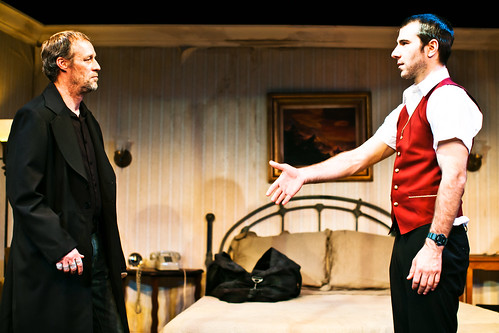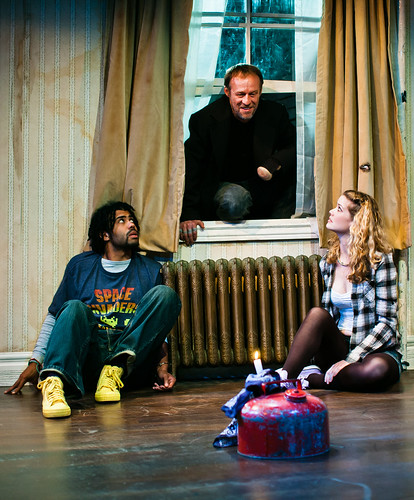Be-handle with care: lost in Spokane
The best two things about SF Playhouse's A Behanding in Spokane are Rod Gnapp (left) as Carmichael and Alex Hurt as Mervyn the receptionist. Below: Gnapp surprises Daveed Diggs as Toby and Melissa Quine as Marilyn. Photos by Jessica Palopoli
What did Spokane, Washington ever do to Martin McDonagh? The London-born, Ireland-identified playwright famously wrote six plays, including The Beauty Queen of Leenane and The Cripple of Inishmaan, in a year and then moved on to film. His short film, Six Shooter, won an Oscar, and he was nominated again for his screenplay to In Bruges (which he also directed).
Then the fiercely talented McDonagh returned to the stage with his first play set in America. A Behanding in Spokane, which ran on Broadway in 2010, is clearly a McDonagh play, what with the desperation, the black comedy and the flying body parts. But this is minor McDonagh, and, in fact, Behanding is a pretty lousy play.
The characters are, at best, sketched in, and the thrust of the play is that cruelty breeds loneliness, young people are idiots and racism is hilarious. There are moments of tension in the play, but they just as quickly go slack, and a 90-minute play ends up feeling like a needlessly prolonged sketch.
Bay Area audiences get their first whack at Behanding in a sturdy production from SF Playhouse, efficiently directed by Susi Damilano and cast with four appealing actors. But try as they might, this team can't make much of a play that lets them down at every turn.
Rod Gnapp, no stranger to intensity on stage, is Carmichael (a role originated on Broadway by the King of Quirk himself, Christopher Walken), a stranger in town looking for the hand that a group of bullies supposedly removed – with the help of a speeding train – 27 years before. In a stained and decrepit hotel room (realistic set by Bill English), Carmichael is in the midst of a deal gone bad. Two young con artists, Daveed Diggs as Toby and Melissa Quine as Marilyn, have failed in a big way to deliver what they had promised: Carmichael's long, lost hand.
Attempts to create tension involving candles in gas cans, handcuffs and guns flare up and fade quickly. The plot, such as it is, goes nowhere, and the play's conclusion is confusing, sentimental and ridiculous.
Gnapp's performance as Carmichael delves into some depth, but the skilled actor can only go so far before McDonagh's shell of a character just crumbles. Alex Hurt is superb as Mervyn, the spaced-out guy from the reception desk who kinda wants to be a hero and kinda has a death wish. For some inexplicable reason, he has a direct-address monologue to the audience that, while funny, is completely out of step with the rest of the play. At least Mervyn offers a fresh perspective on this strange hybrid of noir-meets-Western – film tropes that fail connect on stage.
When Carmichael and Mervyn begin to connect – psychopath attracts psychopath – the play comes to life in a way it hasn't, but then that promise fades into that previously mentioned horrible ending.
And then there's the casual racism that's supposed to be funny, funny in a way that exposes how horrible and out of date it's supposed to be. But McDonagh has thrown this element into the mix only halfheartedly. Are the nearly 20 mentions of the "n-word" really worth it in the end? Absolutely not – not funny, not interesting, not revealing.
[bonus interview]
I chatted with Behanding director Susi Damilano, actor Rod Gnapp and properties master Jacquelyn Scott for a feature in the San Francisco Chronicle. Read the story here.
FOR MORE INFORMATION
Martin McDonagh's A Behanding in Spokane continues through June 30 at SF Playhouse, 533 Sutter St., San Francisco. Tickets are $20-$70. Call 415-677-9596 or visit www.sfplayhouse.org.

